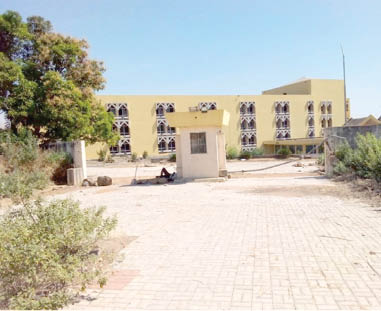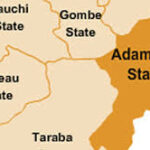Adamawa State is home to a plethora of comatose companies, that have collapsed. They can be categorised into two —those that were initiated but abandoned in their infancy, and government-owned enterprises that commenced operation but were eventually grounded due to economic downturn or mismanagement.
Weekend Trust reports that while some of the companies are beyond revival, others have the potential for resuscitation.
During the era of the defunct Gongola State, a significant milestone was achieved with the establishment of the Savannah Sugar Company, a collaborative effort between the federal government and the Commonwealth of Nations.
The construction of Kiri Dam on River Gongola between 1982 and 1983 was a crucial component of this project, primarily designed to supply water to the Savannah Sugar Company and generate hydropower electricity, thereby boosting the local economy.
- How insurtechs, underwriters deepen insurance spread with embedded covers
- How Southern Kaduna cultural festival is reviving lost bonds
Situated in Shelleng Local Government, the dam was a testament to the successful partnership between the Nigerian government and the Commonwealth.
But the privatisation of the Savannah Sugar Company during the administration of Boni Haruna due to mismanagement and inefficiency ultimately led to the defeat of the project’s original objectives.
Having been revived by the Dangote Group, the company now operates as a private investment, depriving the host communities of its intended benefits.
The Nigerian Road Construction Company (NRC) established by the then Gongola State Government in the 1970s is another state-owned company that has gone moribund.
The company was established during a period of administrative change – when Borno and Bauchi states were created out of Gongola.
Initially, the NRC was expected to play a significant role in the state’s development, but it ultimately failed to live up to expectations. The company’s decline was marked by a series of challenges, including a protracted legal dispute with British workers. The dispute, which dragged from 1990 to 2000, was eventually settled and some payments made to the affected workers.
In an effort to revitalise the company, the Adamawa State Government decided to privatise it. However, this move ultimately led to the sale of the company’s premises and machinery to Atiku Abubakar. Interestingly, the sale was not without controversy as some families later came forward to claim that the land on which the NRC was built had been owned by their grandparents for over 150 years. The matter was taken to court, but the Adamawa State Government emerged victorious. The sale of the NRC to Atiku Abubakar was finalised during the administration of Governor Muhammadu Bindow.
The third company that failed to take off is the brewery, which was established with the goal of producing beverages in Gongola State.
The brainchild of the then Governor Bamanga Tukur, the project was initiated between 1983 and1984 but was halted when Muhammadu Buhari took over. The Buhari administration attempted to revive the project, building a brewery in Damare, Gerei Local Government Area, which now serves as the permanent orientation camp for the National Youth Service Corps (NYSC).
Interestingly, the local population mistakenly believed that the company was intended for alcoholic production due to the word, brewery, but its purpose was to produce soft drinks. Despite this, the project’s objectives were never realised and the state government struggled to find a suitable investor to revive the company. It wasn’t until the administration of Governor Ahmadu Umaru Fintiri that the site was converted to an NYSC orientation camp. The structure’s design still bears the hallmarks of a company rather than a camp.
Also, Africola, a state-owned enterprise, was a prominent producer of soft drinks in Adamawa State during the military regime, between 1997 and 1999. Although the company’s operation ceased around that period, remnants of its presence have remained, including abandoned bottles.
During its heydays in the late 1980s to early 1990s, Africola was a thriving business with its own fleet of vehicles for the purpose of distribution. Unfortunately, many of the vehicles were involved in an accident in 1995, marking the beginning of the company’s decline.
In the early 2000, the Adamawa State Government privatised the company, following which Atiku Abubakar acquired it and began to produce Faro bottled water between 2004 and 2005. The company expanded its product line to include other beverages between 2015 and 2017, unfortunately it began to collapse around 2019 and reverted to producing only bottled water.
Africola was initially a joint venture between private entities and the Gongola State Government, but it was eventually liquidated.
Furthermore, Yola International Hotel, a joint venture between the Ministry of Commerce and Arewa Hotels, was slated for renovation and revitalisation during the Nyako administration; Abdulrahman Abba oversaw the project, but it ultimately stalled due to unforeseen circumstances.
In a perplexing turn of events, the hotel’s furniture were removed and auctioned rather than refurbished or replaced as part of the renovation plans. The project’s fate remains uncertain as it is currently not in use.
The Commissioner for Culture and Tourism in the state, Aloysius Babadoke, announced the plan to award a new contract to private partners who would revive the hotel.
Following an inspection of the premises, Governor Fintiri pledged to revive the hotel before the end of his tenure.
Adamawa also established a printing press, which operated under the Ministry of Information. The company was responsible for printing sensitive documents, calendars and commercial materials, but it has been inactive for decades, with machinery dating back to 40 years.
Similarly, the Adamawa Press Limited, publishers of The Scope newspaper, ceased printing operations.
Despite having the capacity to handle commercial printing jobs, the company’s machines have been out of use for over a decade. As a result, The Scope newspaper is now printed externally.
Another notable company is the Mubi Burnt Bricks Company renowned for producing high quality bricks.
During the administration of Governor Boni Haruna, the company experienced a brief resurgence. His decision to source burnt bricks from the Mubi company for the construction of the ultra-modern Jimeta market provided the much-needed stimulus. However, the company has been dormant since then.
More so, the Gombi Chalk Industry was established during the military administration as part of a broader initiative to set up cottage industries in each local government area of the state. The Gombi industry focused on producing chalk, leveraging on local limestone deposits.
Although the educational landscape has evolved, with many schools transitioning from traditional chalk, the industry’s products could still be relevant if operational.
Also, located adjacent Federal Government Girls’ College (FGGC) is the Gemstone Jewellery Company, but despite being granted a prime location, unfortunately, the company failed to take off, leaving its potentials unrealised.
Towards the end of Governor Bindow’s administration, a notable initiative was undertaken in the solid minerals sector. Commissioner Shetty Sashe led a team on a fieldwork expedition to identify and map areas rich in solid mineral deposits.
The Ministry of Solid Minerals showcased an array of samples, highlighting the vast potentials for revenue generation these natural resources hold for the state.
In the 1990s, a national cocoa development programme was launched, which identified Ganye Local Government Area as a prime location for cocoa production.
The programme gained momentum and an initial progress was made. However, after a few years, the initiative seemingly lost steam and all activities have since come to a halt.
The Adamawa Agricultural Mechanisation Authority (AAMA), formerly known as Gongola Agricultural Authority (GAMA), has undergone a transformation to become a key player in the state’s agricultural sector.
One of AAMA’s primary services is tractor hiring, aimed at supporting local farmers. Notably, during the administration of Governor Boni Haruna, over a hundred brand new tractors were acquired with the intention of bolstering hiring services. If fully utilised, this initiative would have significantly alleviated the challenges faced by farmers in the state and enhanced agricultural productivity.
The Adamawa Investment and Property Development Company, which targeted the hospitality industry, such as Adip Hotel, also ended in disappointment.
Located on Barracks Road, adjacent Saleh Muchika’s residence, the hotel was initially envisioned as a hub of economic activities, but its inability to effectively manage the property led to its lease to a Kaduna-based firm. Unfortunately, this partnership proved unsuccessful as the hotel was neglected.
In the 1990s, Gongola State also established the Highland Bank as other states ventured into the banking sector. Initially, the bank thrived, but its fortunes declined due to rampant loan defaults by board members, who squandered funds without repayment; hence its collapse was inevitable.
Following the creation of Taraba State, assets were divided and Highland Bank’s remnants were absorbed into the United Bank for Africa (UBA). Meanwhile, the Highland Tea Plantation, situated in Mambila, remained under the Gongola State Government’s ownership.
After the creation of Taraba State, a sharing formula was devised, but the plantation’s fate remains uncertain.
During the Gongola era, Adamawa State was carved out and Group Captain Abubakar Salihu commissioned the Adamawa Abbatoir and Meat Factory.
This modern facility, built by a Bulgarian company between 1990 ands1991, boasted of cutting-edge technology, including stone guns to stun animals, and an automated slaughter assembly line. But regrettably, the factory’s current status is uncertain.
As a major livestock-producing state with a dedicated Ministry of Livestock, Adamawa’s lack of a functioning meat factory raises questions about its economic potential and development priorities.
The amusement park, now converted into a zoo, once served as a popular recreational hub, where children and families would gather during holidays. Visitors would pay a fee to enjoy horse riding and other attractions. Although still under the Ministry of Commerce’s management, the park has deteriorated, becoming a mere shadow of its former self.
During Governor Nyako’s tenure, an ambitious plan was proposed to expand the service to include river transportation, connecting Yola to Garwa, Cameroon, a journey of less than two hours.
Reactions
A resident of Yola town, Awal Bin Ali who spoke on the impact of the moribund companies in Adamawa said, “It is unfortunate. People live in poverty when the state should be a prosperous one.”
He explained that if the companies were working, unemployment and social vices like theft would reduce. “The absence of these companies has hurt the state’s economy,” he added.
Advising the government, he said, “Do everything possible to revive these companies so people can find relief. These companies can have employed many youths. Their revival is key to the state’s progress.”
Abdullahi Yakubu Abdullahi, an analyst, attributes the collapse of government-owned companies to the inherent inefficiency of government-run businesses. According to him, Nigeria’s economic system, neither purely capitalist nor socialist, has struggled to find its footing, especially during the military era and subsequent transition to a presidential system.
“The key factors contributing to the collapse of these companies include lack of trustworthy leadership, ineffective management and an inefficient economic system.
“Individuals entrusted with public funds exploited their positions for personal gains, treating state resources as a “national cake” to be lavishly spent.
“Government officials mismanaged funds, using company resources for personal enrichment, and excessive loans from commercial banks for selfish purposes. Nigeria’s unique blend of welfarism and privatisation has hindered economic growth.”
Abdullahi recommends public-private partnership, an enabling environment and good governance as solutions, adding that collaboration between the government and private entities can foster growth and development.
He also said that providing business owners with necessary resources, such as land and investments could stimulate economic activities, adding that effective leadership and transparent management practices are crucial for building trust and promoting economic prosperity.
He praised the Governor Fintiri administration for its forward-thinking approach, citing the Yola market project as a notable example. He emphasized the importance of focusing on policy execution and providing opportunities for people to drive growth.
The State Executive Council recently gave the greenlight for the renovation and construction of the Adamawa Agricultural Mechanization Agency’s (AMA) headquarters offices and central workshop, at a cost of over N197 million.
We are committed to reviving dormant companies – Govt
Reacting, Dr Ishaya John Dabari, Adamawa State’s commissioner for commerce, emphasized government’s commitment to reviving dormant companies, saying, “We are making concerted efforts to revive these companies, driven by our philosophy of leaving no stone unturned and no one behind.”
The commissioner outlined key development areas, including upgrading health care facilities and services, enhancing infrastructure, such as roads and bridges, improving education, supporting business development and entrepreneurship and promoting sports facilities and events.
“The government has approved 18 memos aimed at stimulating growth, including market development to attract investors and boost commerce. Notably, efforts are underway to revive the Mubi Burnt Bricks Company, with the first meeting in 23 years, explore public-private partnerships for the Yola International Hotel, and support operational industries like the Savannah Sugar Company and other small enterprises.
These initiatives demonstrate government’s dedication to revitalising Adamawa State’s economy,” he said.

 Join Daily Trust WhatsApp Community For Quick Access To News and Happenings Around You.
Join Daily Trust WhatsApp Community For Quick Access To News and Happenings Around You.


